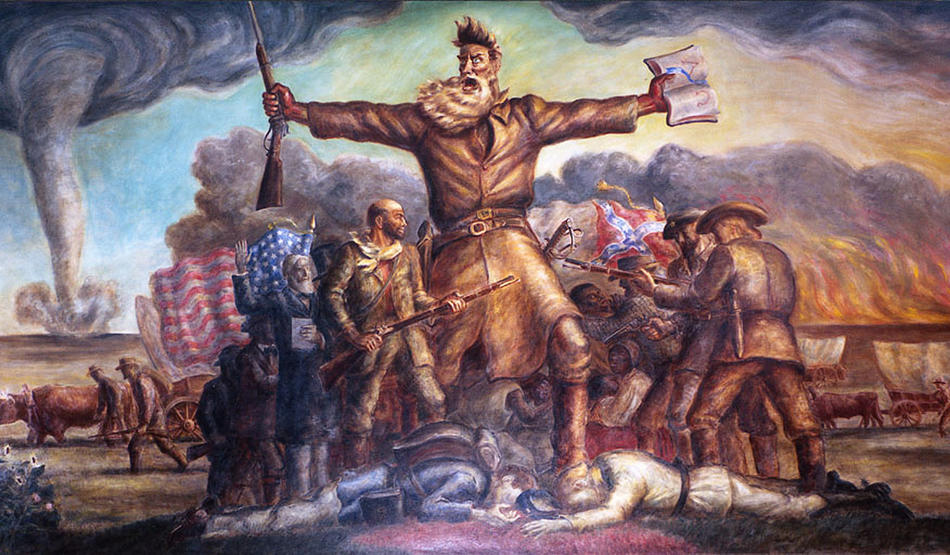When it was announced at the National Book Awards dinner on November 19 that James McBride ’80JRN had won the fiction award for his novel The Good Lord Bird, the author bounded to the stage clutching not an acceptance speech, but a napkin. Later, he told the New York Times that he’d been so surprised to win, beating out front-runners like Jhumpa Lahiri and George Saunders, that instead of listening to the announcement, he’d taken a big bite of dessert. The moment matches his book perfectly — unpretentious, very funny, and totally endearing.
At the center of McBride’s irreverent tale is Old John Brown of Harpers Ferry fame, one of the earliest and boldest white abolitionists, who strove to eliminate slavery one gunfight at a time. This isn’t Brown’s debut as a literary subject — he makes appearances in Herman Melville’s “The Portent,” Russell Banks’s Cloudsplitter, and Marilynne Robinson’s Gilead, to name just a few — but McBride’s take is an outrageous caricature of a man, “smelling of buffalo dung, with a nervous twitch in his jaw and a chin full of ragged whiskers.” A religious zealot, Brown constantly thwarts his own progress by interrupting raids to drop to his knees and pray, misquoting the Bible so spectacularly that his verses “all bumped and crashed and commingled against one another till you didn’t know who was who and why he was praying for it.”
The book is narrated by Little Onion, a young slave boy whom Brown takes for a girl and kidnaps (or “liberates,” as he would say) from a Kansas Territory home. Initially, freedom doesn’t sit so well with Onion. As a slave, he was well fed and connected with his kin, and traveling with Brown and his army (“nothing but a ragtag assortment of fifteen of the scrawniest, bummiest, saddest-looking individuals you ever saw”), particularly disguised as a girl, isn’t easy. So unsavory is the life that Brown promises, that he has to beg some slaves to join him: “I’m Captain John Brown! Now in the name of the Holy Redeemer, the King of Kings, the Man of Trinity, I hereby orders you to git. Git in His holy name! Git! For He is always on the right side of justice!”
The setting of The Good Lord Bird, far from the Deep South in the lawless but slightly less racially oppressive Kansas Territory, is perhaps what makes it possible for McBride to marry slavery with comedy. The characters know that there is a far worse place for blacks; people are constantly threatening to send Onion to New Orleans, where the choice between slavery and freedom wouldn’t be so difficult. Still, any comic novel about such a calamitous time is a daring conceit, which in the wrong hands could go painfully wrong. McBride’s America feels huge, chaotic, and very much in formation, and yet he still manages to ask the important question: why did it take us so long to separate the most basic rights from wrongs?
Peppered throughout the book are charming cameo appearances by historical figures, and like Brown, they aren’t always as the history books have had us believe. A saintly Harriet Tubman gives Onion her scarf, which eventually grants him safe haven on the Underground Railroad. But Frederick Douglass doesn’t emerge as quite so sympathetic. Rather, he is, in Onion’s words, “a speeching parlor man,” who lives with his black wife and white mistress and rejects Brown’s pleas to accompany him to Harpers Ferry, calling it a suicide mission.
McBride is best known for his memoir, The Color of Water, a staid look at his mixed-race heritage that spent two years on the bestseller list in the late 1990s, so this kind of picaresque adventure is a surprising turn. Comparisons to Twain are inevitable, particularly given McBride’s use of vernacular — or, as McBride put it in an interview, “that old country talk.” But the raucous joy of traveling with Brown and his army also recalls Chaucer and Boccaccio. Brown may not be a polished hero, but he’s certainly an entertaining one, particularly with his band of not-so-merry men and one spunky, cross-dressing kid in tow.



